Resonant Voices Radar exposes false, biased or manipulated online content that feeds division and mobilizes support for groups and causes that threaten public safety, human rights, and democracy.
The Resonant Voices Radar’s team monitors the digital ecosystem of open online channels that produce and disseminate misinformation, partisan and extremist propaganda, hate speech, unsubstantiated claims, and other dangerous online messages that spread across borders, languages, and platforms, affecting transnational diaspora communities.
In June 2020, the Resonant Voices Radar analysed the resonance and reach of the following stories:
Balkan Anti-Fascism and Its Enemies
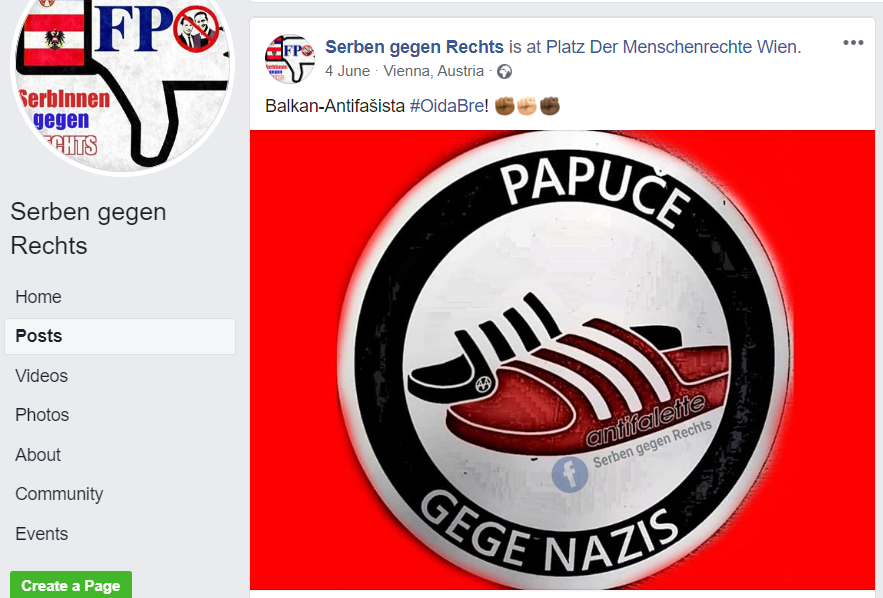
The death of George Floyd in June prompted protests and counter-protests across the USA, and a corresponding spiral of heated online and offline debates, further fuelling divisions across the world. The outbreak of rebellion against systemic racism and police brutality, the Black Lives Matter (BLM) spilled over to outside of the United States, involving in the debate very distanced and different groups – from Kurdish anti-fascist activists and Turkish nationalists in Western Europe, Serbian, Croatian and Albanian nationalists and diaspora members across the world, to supporters of communism, fascism, liberalism and populist movements, regardless of skin colour, religion or nation.
The BLM protest narratives online are connected to broader issues and debates around liberalism, globalisation, national sovereignty, political correctness, elitism, multiculturalism, and migration.
These themes are strengthening partisan and ideological division in the US but also abroad. The ensuing analysis follows the online narratives and messaging about Antifa, which became one of focal points on which the opinions and attitudes are deeply split.
The analysis of Twitter posts performed in SocioViz in June, which used the hashtag Antifa, referring to the leftist movement opposing the far right taking an active and visible role in the BLM protests, shows that in addition to BLM and protest related hashtags, the term is used in a number of politically and ideologically charged debates. Importantly, the use of “terrorist” and “Antifa terrorists” hashtags is prevalent, driven by Donald Trump and his supporters. Unsurprisingly, among the 50 most used hashtags are those linked with his re-election campaign, like MAGA (Trump’s election slogan “Make America Great Again”) or “Trump2020”. Additionally, hashtags associated with the QAnon conspiracy theories, referencing George Soros, “fake news media,” or COVID-19 related issues are prevalent.
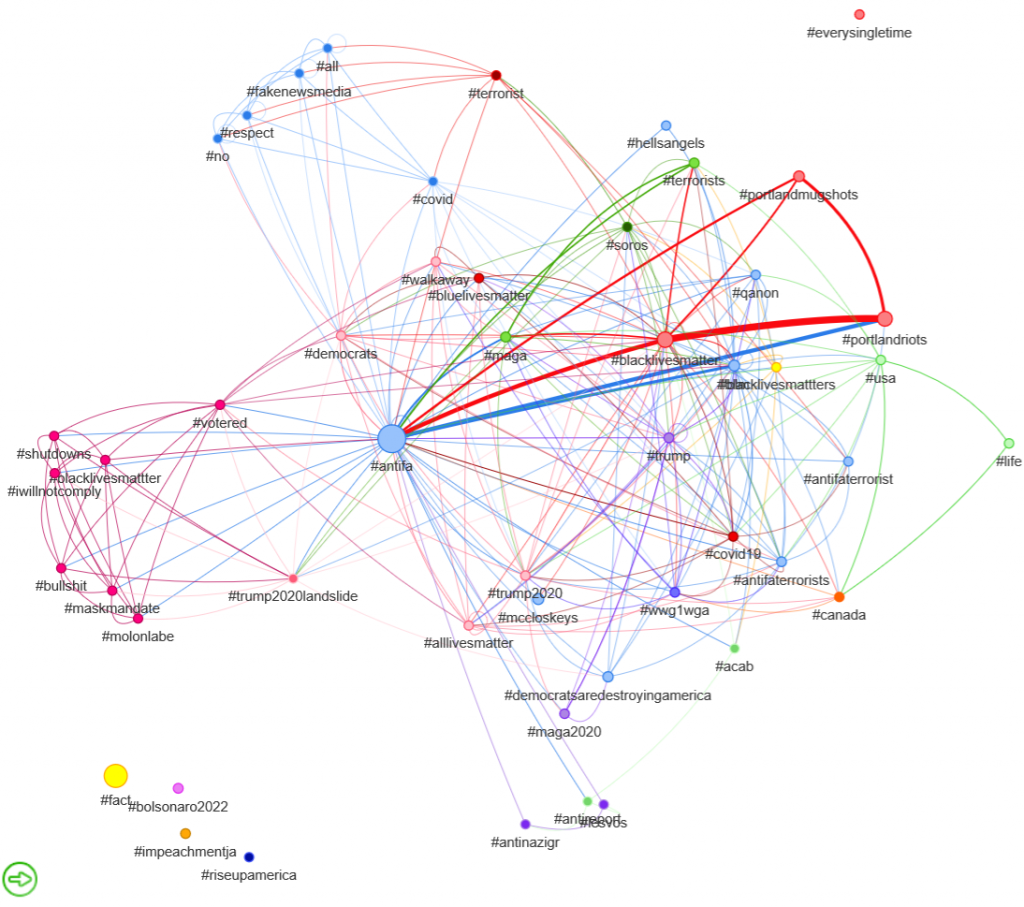
This instrumentalization of the protests for political goals, is a part of a much larger battle that surpasses the American national context. BLM protests rapidly spread to around 60 countries worldwide, and sparked online debates, as well as offline action reaching audiences across the globe also engulfing the Balkans and their diaspora communities.
When it comes to Antifa in the countries of former Yugoslavia, a considerable effort to promoting a narrative that intentionally conflates communism and the anti-fascist tradition, thus discrediting the latter, long preceded the movement’s infamy related to the BLM protests.
Trump’s first announcement that he would declare Antifa a terrorist organisation fuelled the already present ideological battle around the anti-fascist legacy on the territory of the former Yugoslavia, emboldening supporters of the far-right on social media.
BLM Protests Stoke Conflict Among Balkan Diaspora Communities in the US
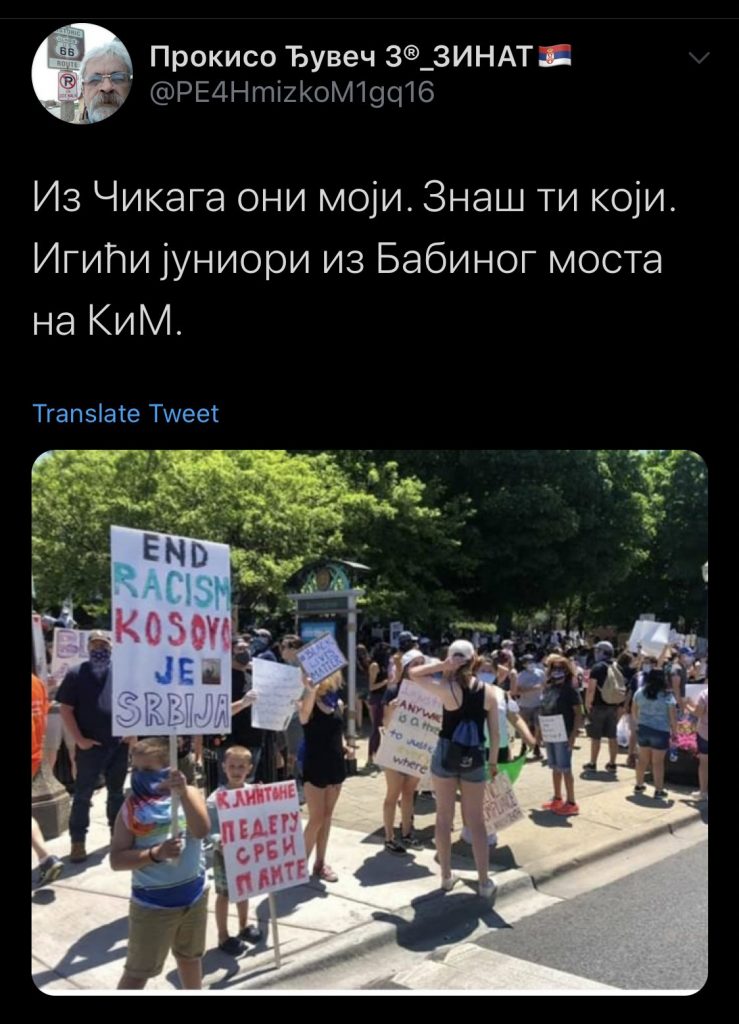
Balkan diaspora communities in the US reacted to the BLM protests passionately. The protests triggered old wounds from the Balkan conflicts, often accompanied by hate speech and divisive messaging in social media, which also spilled into the offline activism.
Members of diaspora communities from different countries of the former Yugoslavia have taken part in the BLM protests and stood up against racism but viewed through a Balkan lens.
The toppling of statues of Confederate leaders prompted an online conflict between the Serb and the Bosniak diaspora in the US. Allegedly, a call was issued by one Bosniak Facebook group to gather volunteers to help organise the toppling of American monuments to General Dragoljub Draža Mihailović, Commander of the Yugoslav Army during the Second World War. This call, which can no longer be found on Facebook, provoked an online spat between the two communities. It did not, however, lead to an offline action, despite false information being published in one forum that “Bosniaks have torn down the statue of Draža Mihailović” in the city of Libertyville near Chicago.
The Albanian/Serbian divide was visible in the online communication of the Albanian and the Serb diaspora about the BLM protests. A photograph from the protests in Chicago was posted on Twitter that showed two children from the Serb community carrying banners, of which one carried the message “End racism. Kosovo is Serbia.” This prompted fierce reactions from the Albanian community and the photograph was shared on numerous portals in the region, even though it was quickly removed by the Twitter user who had originally posted it.
In social media posts, a good portion of the Serb diaspora came to defend Trump’s statements and actions in relation to BLM protests. While the Albanian diaspora often attacked him and promoted Joseph Biden, some Albanians, mostly those that came to the USA from Kosovo, pointed out on social media that Black Americans have been “centuries-old victims in the USA just as the Albanians have been in the Balkans” and that the Albanians were the victims of a similar “state repression and ethnic hatred”.
Members of the Serb community in the USA started the Facebook campaign “Serbs for Trump 2020” with the aim to motivate the millions of Americans of Serbian descent to engage in Trump’s re-election. For now, however, this Facebook page has just a little over a thousand followers.
Were Serbs in Chicago jamming police radio frequency?
The story about Serb community and the BLM protests, with the biggest impact in the Western Balkans, was about a YouTube video of someone interfering with the radio frequency of the Chicago police by playing Balkan music. This video had more than 220,000 views and the coverage of this story in the region expanded the potential audience to 2.2 million people on Facebook alone.
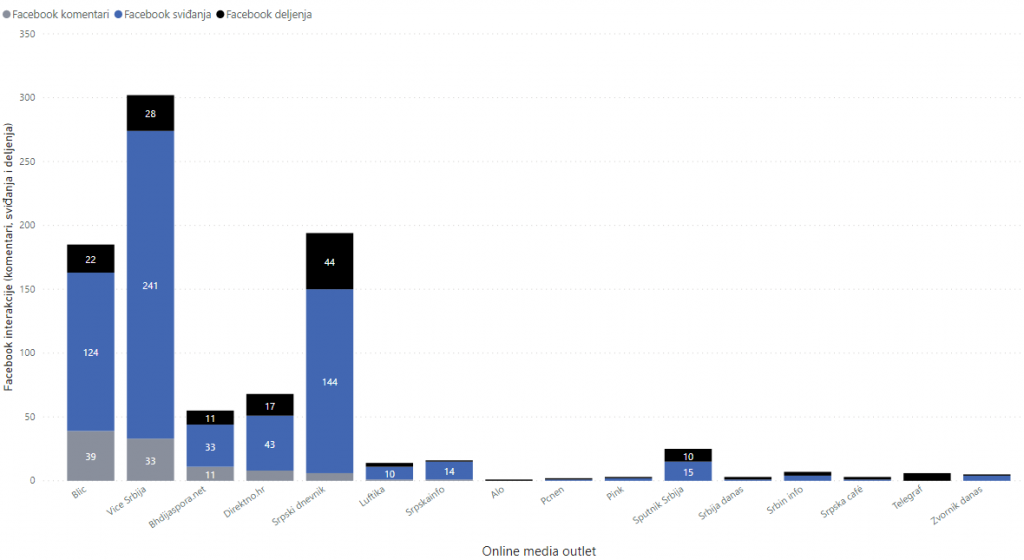
Almost all media in the region presented this story as, “Serbs in Chicago obstruct the police through folk music.” Vice Serbia and Sputnik Serbia noticed that the song that can be heard in the video is the song “Od Bihaća do Petrova sela” (From Bihać to Petrovo selo), which mentions Radovan Karadžić, convicted of genocide against Bosniaks in Srebrenica and is associated with the “Remove Kebab” meme. The expression emerged in the global online far-right and Islamophobic community via the 4chan platform, and later Reddit as a humorous euphemism, masking a dangerous call to kill Muslims.
Even though the media also reported that the Serb community was behind this stunt, it has not been verified or confirmed.
The AfD member of diaspora origin uses BLM protests to amplify his message
The BLM protests in Germany inspired the representative of the Croat diaspora community and a member of the right-wing Alternative for Germany (AfD), Dubravko Mandić, to share his views on the social unrest.
This legal practitioner and politician, who was born in Bosnia and Herzegovina and grew up in Germany, shared a few of his speeches on his YouTube channel in which he comments on the BLM protests in the USA, addressing his viewers as “dear white brothers.” One video titled “Listen to the white guy,” provoked quite a controversy due to racist language Mandić is using and statements about the “racism against white people.”
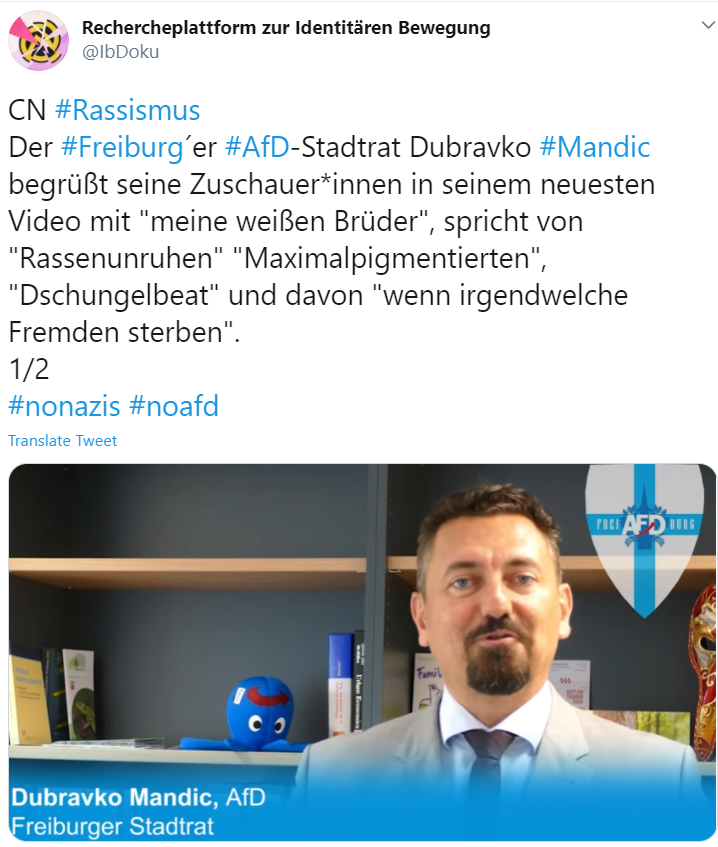
This video was seen by around 7,000 people on YouTube. Among more than 200 comments, it is noticeable that the positive comments very often come from members of the Balkan diaspora in Germany. By far the biggest number of appreciative comments comes from his German audience with a right-wing ideological orientation.
Mandić also promoted his controversial video on Twitter, without much success. His statements received scrutiny and criticism when an organization investigating the Identitarian movement and its connection to other far-right groups, (Rechercheplattform zur Identitären Bewegung) noticed that the leader of the Austrian branch of the Identitarian movement, Martin Sellner, shared Mandic’s video on Telegram app with the message “Listen to Mandic!”

In July, Twitter suspended Sellner’s account and an additional 50 white nationalist accounts amid criticism over its handling of extremist content. In the meantime, Twitter has suspended Mandić’s account as well.
Read more about the attempts by Dubravko Mandić and other representatives of the extreme and populist right-wing attempts to create alliances in the Balkans and increase the support of the Balkan diaspora in Germany in last year’s research conducted by Nenad Radičević, one of the Resonant Voices scholarship awardees in 2019.
Thompson Benefits from Controversy Around Concert Ban
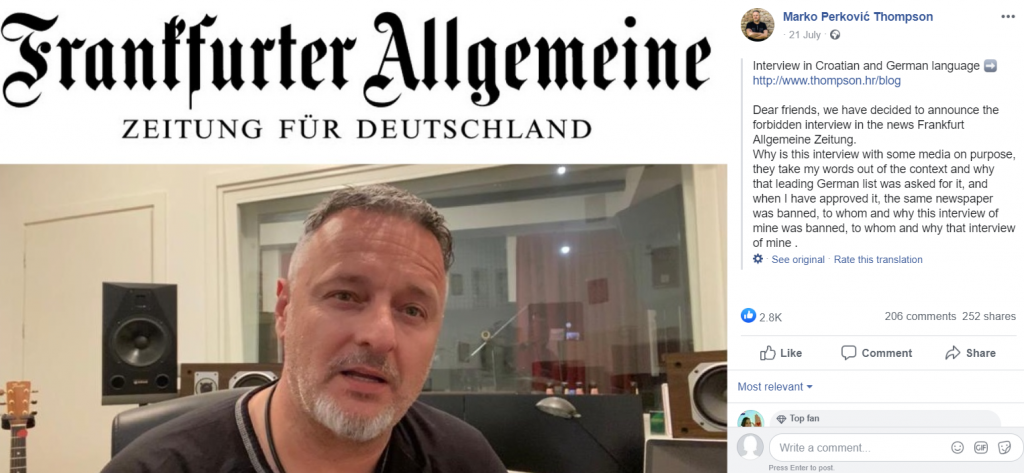
The decision of the authorities of the Slovenian city of Maribor to ban a concert by controversial Croatian singer Marko Perković Thompson sparked passionate online debates among adherents of opposing ideological views. The proliferation of narratives that relativise Ustasha crimes and revise history continue to aim to equate the anti-fascist tradition with communist totalitarianism.
The authorities in Maribor, in explaining their decision to ban the concert, stated that Thompson’s glorification of the Ustasha incited hatred. The fact that Canada, Switzerland and Austria have also banned his performances reflects upon him. The explanation also stated that Thompson’s concert in Maribor would undoubtedly endanger the human rights of the town’s Serb, Roma, and Jewish minorities.
The online debate that ensued in Slovenia and Croatia allowed Thompson’s political messages to reach many more people than the initial performance. Slovenia’s Prime Minister, Janez Janša, also degraded the discourse to the claim that it is the result of, “the communists and their descendants still being in power,” suffocating the “patriots.”
As in the case of regarding the Sarajevo mass for Bleiburg, which May’s Resonant Voices Radar reported, Janša, in his Twitter posts, wholeheartedly supported the narrative which erodes the anti-fascist tradition of Yugoslavia blaming it for crimes of communism. All of this with the aim to relativise the Ustasha movement and other local movements that collaborated with the Nazis in the Second World War.
The debate was further fuelled by the Zagreb’s High Misdemeanour Court’s decision on June 3rd that Thompson did not violate public order and breach the peace by using the Ustasha greeting “Za dom spremni” (Ready for the Homeland) in his song “Bojna Čavoglave.”
The polarisation around Thompson and the issue of Ustasha glorification have travelled beyond the Balkans several times in June aggravating the debate.
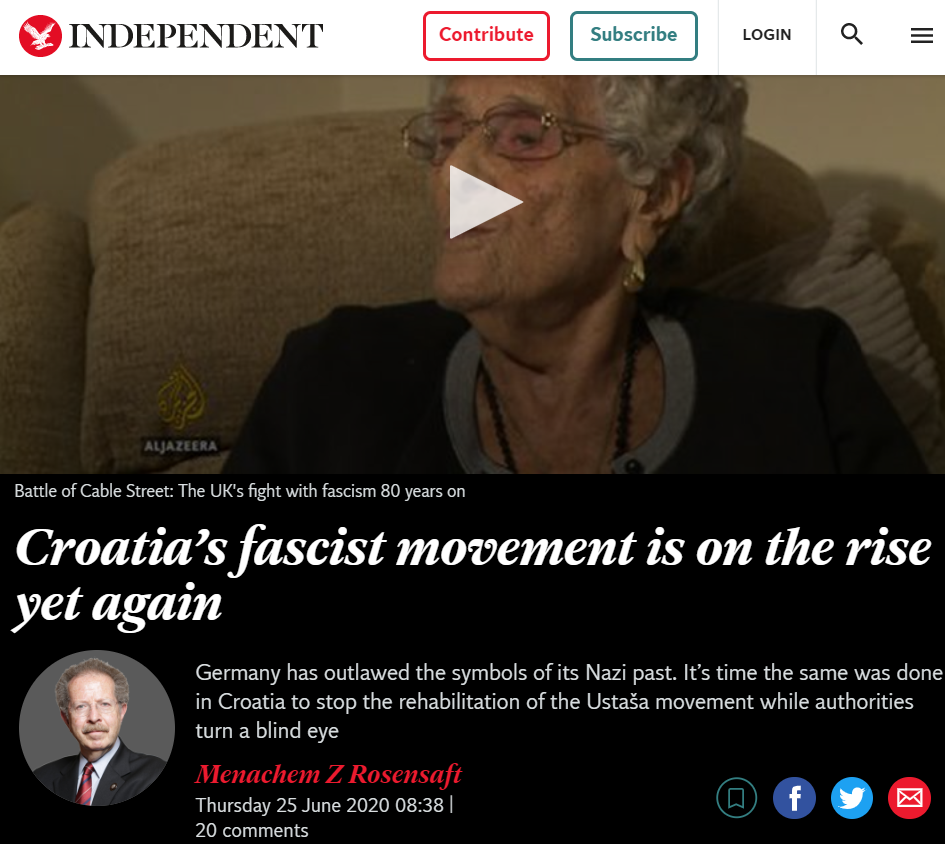
An article titled “Croatia’s fascist movement is on the rise yet again” written for London’s Independent by Menachem Z. Rosensaft, Associate Executive Vice President of the World Jewish Congress, has been used as ammunition in this conflict.
The author condemns the judges of the High Misdemeanour Court in Zagreb in their recent decision that Perković’s public usage of the former Ustasha greeting “Za dom spremni” did not violate public order and breach the peace. Rosensaft’s text states that, “for some time now, we have been witnessing a widespread attempt to rehabilitate and legitimize the Ustaša by characterizing it and its members as patriots rather than as cold-blooded murderers and war criminals.” The author provides specific examples of how public figures contribute to this negative trend, listing the singer among them.
The original article in English had a Facebook reach of more than 9.2 million public profile followers, and a further 2.5 million among the users of Reddit. On Facebook, and on the Independent’s own website, the text garnered a total of around 8,400 reader interactions which is slightly higher than the total number of interactions achieved by 25 media sources in Croatia, Serbia, and Bosnia and Herzegovina that have published a shortened version of the article in the local languages.
Judging by the content of the readers’ comments, the content of this text provoked fierce divides involving many Croatian diaspora groups as well as far right and far left groups within Croatia and Bosnia and Herzegovina.
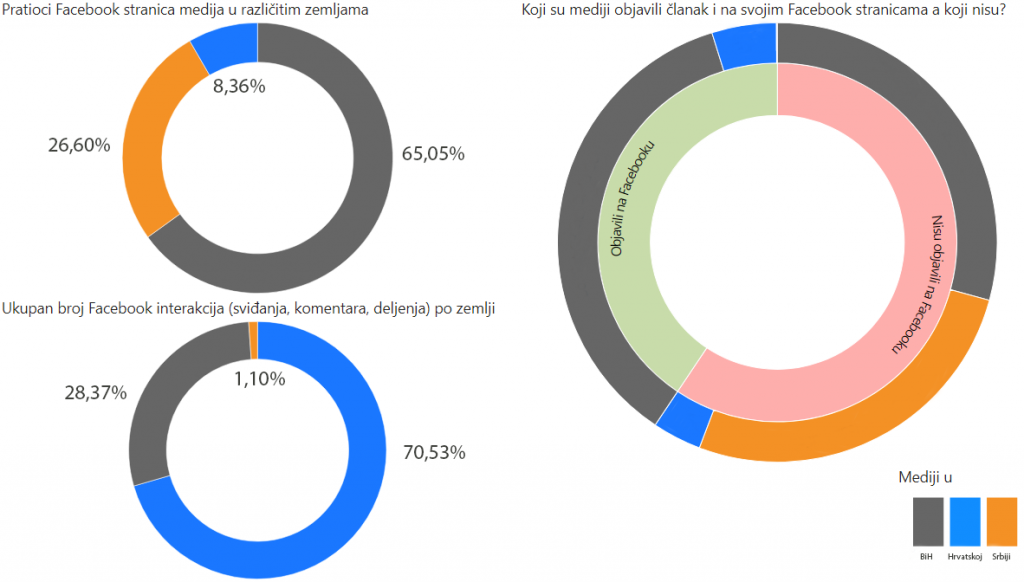
The RVR team’s analysis suggests that much more numerous social media interactions have been prevented by the fact that 11 out of the 25 media outlets, particularly those with the most followers, have not published this article on their Facebook profiles. However, according to the data of the app CrowdTangle, the potential Facebook reach of this content reached in total to 2.4 million Facebook users.
An interview with Perković was published in July by the correspondent of the Frankfurter Allgemeine Zeitung, Michael Martens, after a video showing the German national football player Manuel Neuer singing his songs captured the attention of the German public.
This interview was accompanied by an article written by the same journalist which critically analysed the personality and the works of Perković, presenting him metaphorically as, “wearing a white vest, but a black shirt underneath,” the façade of harmless Croatian patriotism disappearing as soon as the conversation turns to history and politics.
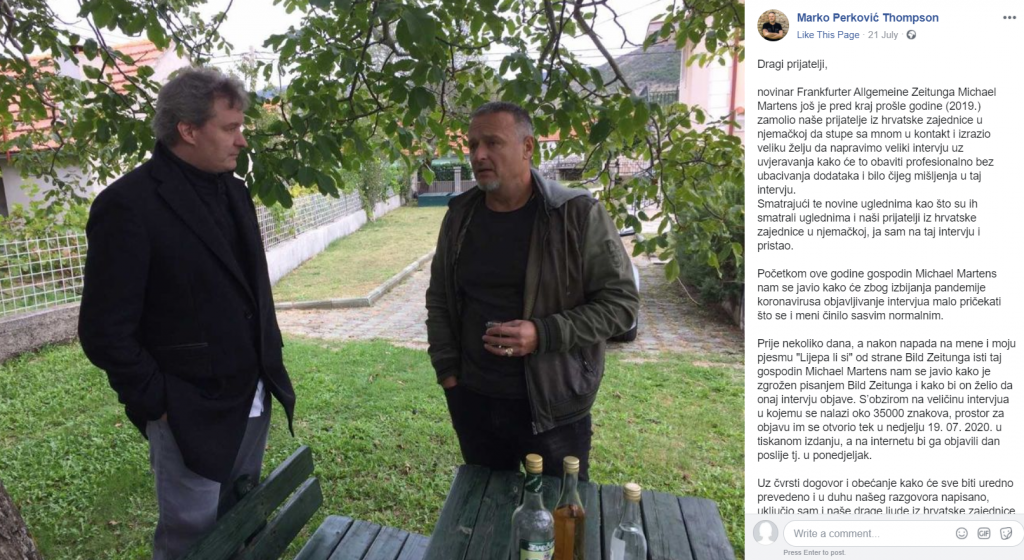
Following the publication of the interview and the accompanying article, Perković used the opportunity to present himself as a victim of unprofessional journalism, bias, and discrimination. First on social media and later in a few interviews which he gave mostly to right-wing media.
His explanation, published on his Facebook profile, prompted more than 4,200 interactions on this platform alone, reaching at least 300,000 users. The reach of his words were multiplied, not just by many media outlets publishing his post, but also by giving interviews to mainstream media.
Skimming through more than 400 comments on Perković’s Facebook post indicates that he succeeded in convincing members of the Croatian diaspora in Germany that he is, like them, a victim of discrimination. As one of the commentators mockingly states, “it is the greatest primitivism to promote ‘religion, the homeland and family’ in Germany or in front of a German and they look at all those, who stand for these real and true values, with contempt and view them as primitives.”
Perković used the cancelation of his concerts in Slovenia and the criticism in the Independent and the Frankfurter Allgemeine Zeitung to his own benefit on social media. By playing the role of a victim of the “lying mainstream press”, discriminated against by authorities, he managed to amplify his political-ideological message and to mobilise his supporters on social media to defend him even more fervently. What is also troublesome, in the case of the dispute regarding the text in the Frankfurter Allgemeine, is that he managed to rally the Croatian World Congress, an organisation that gathers Croats in the diaspora, to address an open letter to the Frankfurter Allgemeine Zeitung.
Voice of Xenophobia and Islamophobia in Europe Shuts Down

“We will be ceasing our news publishing operations indefinitely,” the far-right English-language website Voice of Europe announced to its more than 390,000 Facebook followers and more than 230,000 Twitter followers.
In a last post entitled Farewell, the editorial team cited “increased censorship from Google, Facebook, and Twitter,” and their resulting inability to generate ad revenue from these platforms as the main reasons behind their decision.
According to Media Bias/Fact Check, Voice of Europe “reports stories from European media and frames and spins them in a misleading way that always turns out negative for immigrants and the European Union.” Content had often been sourced from questionable outlets such as Breitbart, Daily Mail, or Sputnik News, according to the Media Bias/Fact Check review.
RVR followed Voice of Europe as it regularly featured stories on violence and crime in the Balkans perpetrated by migrants, published under sensationalist headlines. For example, the story “Serbia: Migrants rob Belgrade churchgoers in the middle of religious service,” was published first by various Serbian tabloids and propaganda outlets and then picked up by Voice of Europe, as was the article “Slovenia: 74 illegal migrants arrested during border security operation,” which was sourced from the Slovenian Democratic Party backed, right-wing news media Nova24TV and then retweeted by Slovenian Prime Minister, Janez Janša.
Voice of Europe’s Facebook and Twitter followers often used intolerant, anti-migrant, and Islamophobic language, occasionally calling for the use of violence. Many followers lamented the decision announced by Voice of Europe, offering funding contributions and advice on how to restructure the operation, demonstrating continuing demand for this type of reporting.
Never-Ending Infodemic
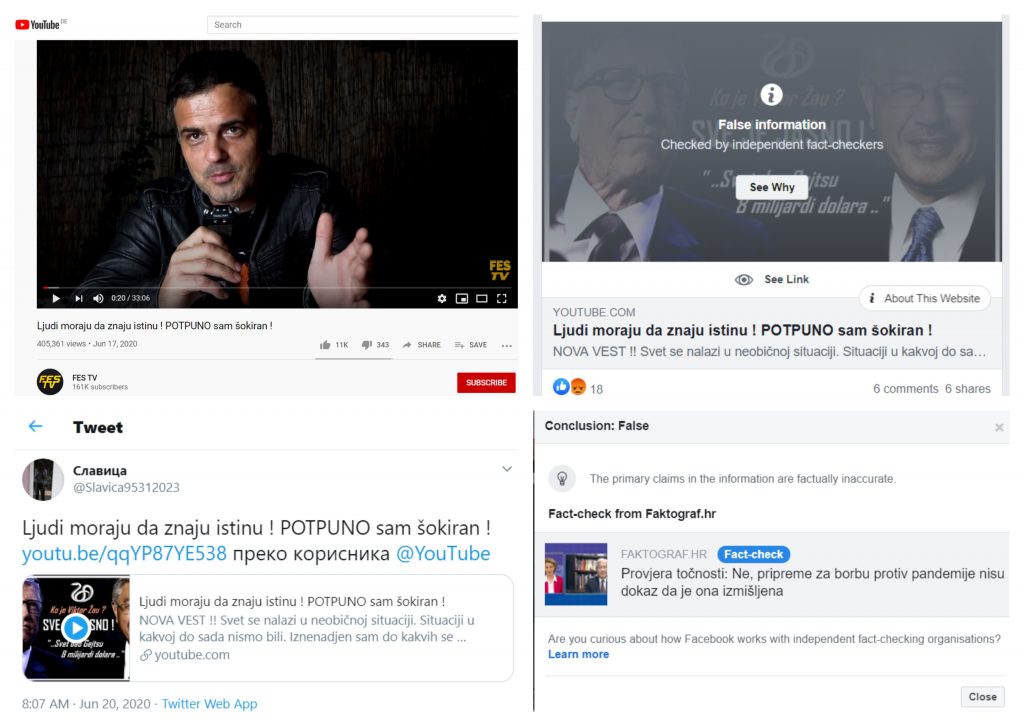
The pandemic of disinformation about the Coronavirus, which was discussed in April’s and May’s Resonant Voices Radar, continued in June as well. The RVR team noticed that during these three months the YouTube channel FES TV stood out as very influential in spreading controversial information about the pandemic among social media users in the Western Balkans and among its diaspora.
This YouTube channel belonging to the vlogger Goran Božović has, for some time, been a popular source of pseudo-scientific content and wild conspiracy theories. However, during the COVID-19 pandemic, this channel increased its influence on social media by translating and publishing videos of German and French doctors disputing the significance of the coronavirus which even reached viewing figures of 1.6 million per video.
In June, two videos with controversial content echoed across the online community with more than 735,000 views and more than 42,200 interactions (likes, comments, shares) on Facebook and YouTube.
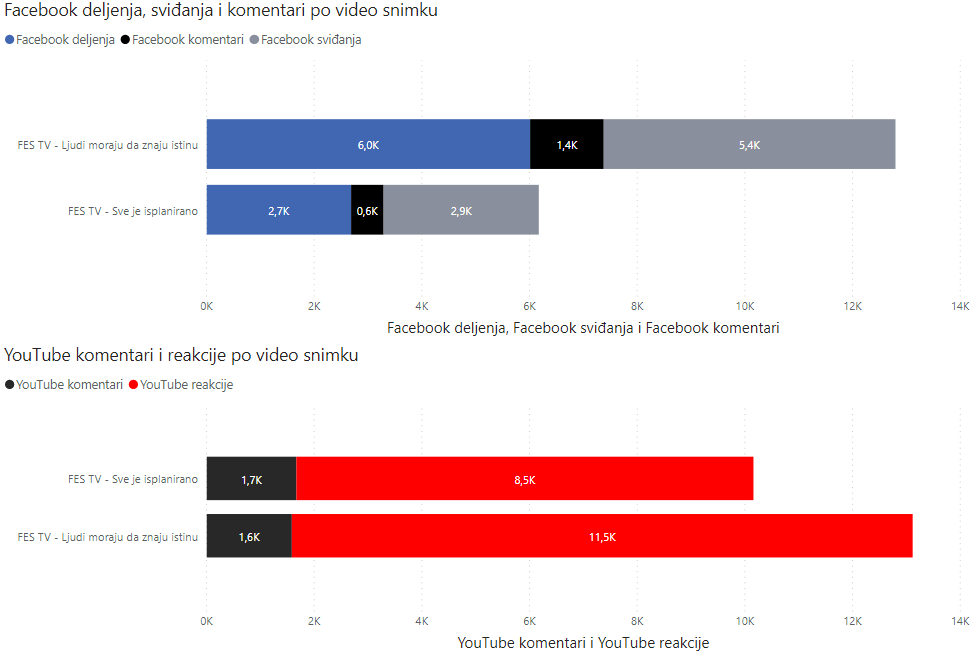
Both videos, first titled People have to know the truth! I am completely shocked! and the second titled It was all planned from the beginning! Agenda 21 begins! present documents and events related to pandemic prevention and preparedness from before the COVID-19 outbreak as “proof” of the conspiracy theory that the current pandemic was planned.
Platforms reacted differently — YouTube and Twitter did not mark them nor did they check posts with this video. Even though both videos relate to coronavirus issues, Twitter has not even listed the usual uniform link to websites with the World Health Organisation’s latest information about the coronavirus.
Contrary to that, Facebook obscured both videos in each post and marked them as false information, referring to the Croatian fact checking portal Faktograf.hr and offering a link to the analysis of the credibility of the contents which was conducted by this portal. The portal Faktograf.hr is one of 70 partners checking the truthfulness of contents in 50 languages across the world.
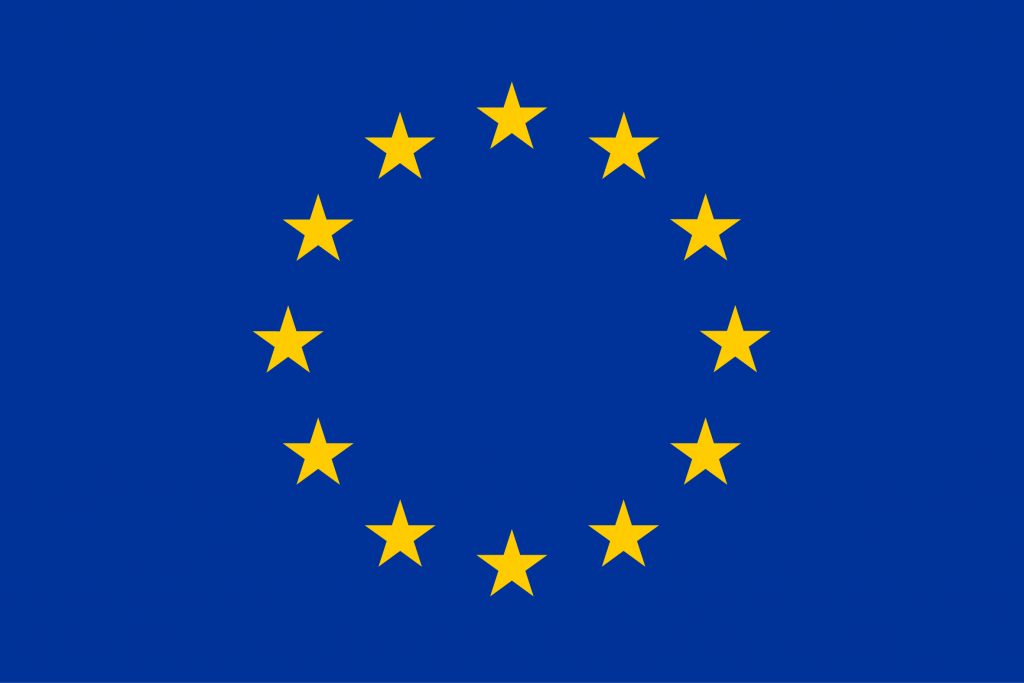
The Resonant Voices Initiative in the EU is funded by the European Union’s Internal Security Fund – Police.
The content of this report represents the views of the Resonant Voices Initiative’s media monitoring team and is the sole responsibility of the Resonant Voices Initiative. The European Commission does not accept any responsibility for use that may be made of the information it contains.
